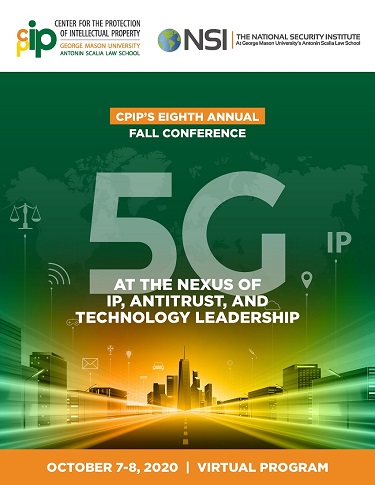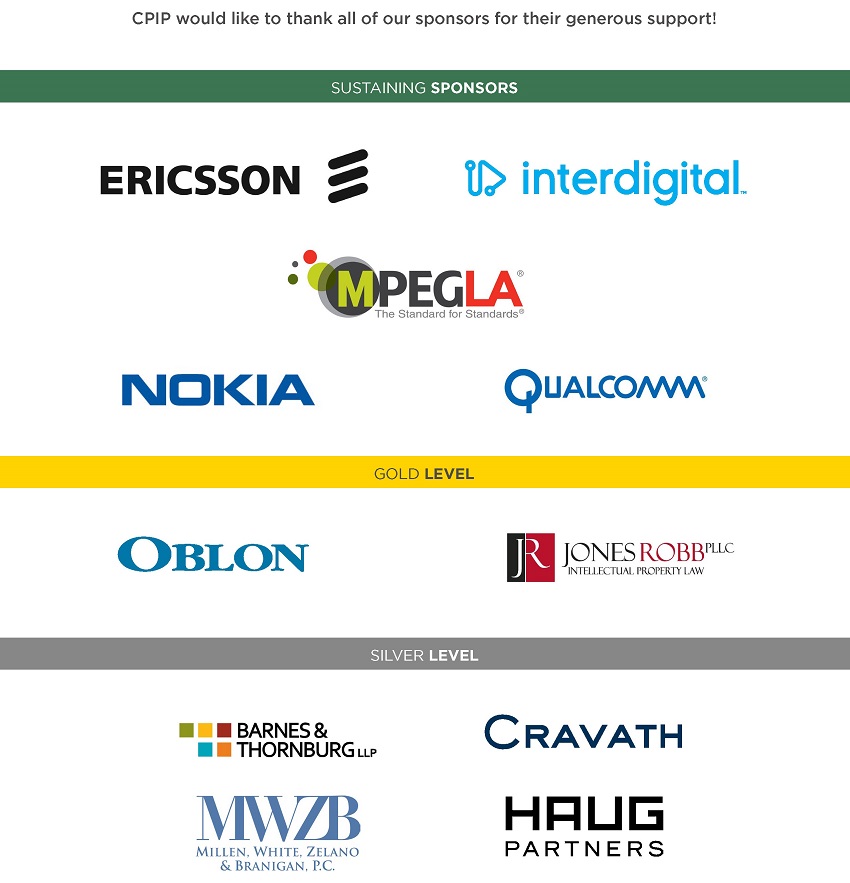
Annual Fall Conference
Co-Hosted with the National Security Institute (NSI)
5G at the Nexus of IP, Antitrust, and Technology Leadership
October 7-8, 2020
Virtual
On October 7-8, 2020, CPIP hosted its Eighth Annual Fall Conference online from George Mason University Antonin Scalia Law School in Arlington, Virginia. The conference featured a keynote address by the Honorable Andrei Iancu, and it was co-hosted by Scalia Law’s National Security Institute (NSI).
This conference addressed fast-emerging intellectual property (IP), antitrust, and technology leadership issues in the 5G and “Internet of Things” innovation ecosystem. Coverage included standard-essential patents (SEPs) along with established and emerging markets on a regional and global basis. Speakers were drawn from the academic, industry, and policymaking communities, with an emphasis on using objective fact-based analysis to explore points of convergence among legal, economic, and geopolitical perspectives on the IP and regulatory infrastructures that underlie these critical industries.
CONFERENCE MATERIALS
REMARKS, KEYNOTE, & SESSIONS
WEDNESDAY, OCTOBER 7, 2020
OPENING REMARKS & INTRODUCTIONS
- Joshua A. Kresh, Deputy Director, Center for the Protection of Intellectual Property, George Mason University Antonin Scalia Law School (@cpipgmu)
- Sean M. O’Connor, Professor of Law, George Mason University Antonin Scalia Law School, Executive Director, Center for the Protection of Intellectual Property (@ProfSeanOConnor | @cpipgmu)
SESSION 1: USING DATA TO INFORM POLICY: EMPIRICAL EVIDENCE ON SEPS, SSOS AND FRAND ROYALTIES
This session will present empirical evidence relating to patent holdup, patent holdout and royalty stacking, the valuation of SEPs and the determination of FRAND royalty rates. Speakers will also address how empirical evidence has impacted the evolution of antitrust policy and judicial decisions relating to SEPs and FRAND royalties.
- Dr. Anne Layne-Farrar, Vice President, Charles River Associates (@News_CRA)
- Stephen Haber, A.A. and Jeanne Welch Milligan Professor, School of Humanities and Sciences, Stanford University, Peter and Helen Bing Senior Fellow, Hoover Institution (@Stanford | @HooverInst)
- Daniel F. Spulber, Elinor Hobbs Distinguished Professor of International Business and Professor of Strategy, Kellogg School of Management, Northwestern University (@KelloggSchool)
- Moderator: Theodore R. Essex, Counsel, Hogan Lovells, Professorial Lecturer in Law, George Washington University Law School (@HoganLovells| @gwlaw)
KEYNOTE ADDRESS & FIRESIDE CHAT
- Hon. Andrei Iancu, Under Secretary of Commerce for Intellectual Property, United States Department of Commerce, Director, United States Patent and Trademark Office (@uspto)
- Sean M. O’Connor, Professor of Law, George Mason University Antonin Scalia Law School, Executive Director, Center for the Protection of Intellectual Property (@ProfSeanOConnor | @cpipgmu)
SESSION 2: IP MEETS ANTITRUST AROUND THE GLOBE: POLICY DEVELOPMENTS IN THE LEGAL TREATMENT OF SEPS AND FRAND
This session will discuss recent international developments, including convergence and divergence across major jurisdictions, in the legal treatment of SEPs and FRAND (both as a matter of patent and antitrust law), covering issues such as injunctive relief, component-level licensing and the determination of FRAND royalties. This session will also discuss the extent to which courts and regulators’ thinking on patent holdup, patent holdout and royalty stacking have evolved in response to academic debates.
- Maureen K. Ohlhausen, Partner, Baker Botts LLP, Former Acting Chairman, Federal Trade Commission (@M_Ohlhausen | @bakerbotts)
- Dr. Urška Petrovčič, Senior Fellow, Hudson Institute (@HudsonInstitute)
- D. Daniel Sokol, Professor of Law, University of Florida Levin College of Law, Senior Advisor, White & Case LLP (@UFLaw | @WhiteCase)
- John M. Yun, Associate Professor of Law, George Mason University Antonin Scalia Law School, Director of Economic Education, Global Antitrust Institute (@georgemasonlaw | @GAI_GMU)
- Moderator: Henry N. Butler, Allison and Dorothy Rouse Dean & George Mason University Foundation Professor of Law, George Mason University Antonin Scalia Law School, Executive Director, Law & Economics Center (@georgemasonlaw | @MasonLEC)
THURSDAY, OCTOBER 8, 2020
SESSION 3: MARKETS WORK: PRIVATE ORDERING MECHANISMS IN PATENT-INTENSIVE MARKETS
This session will present evidence relating to the mechanics and performance of past, existing and emergent mechanisms devised by private industry for preempting transactional frictions and facilitating technology dissemination in patent-intensive markets, including evolving licensing platforms in IOT environments. Speakers will also address how IP and antitrust policy can support or undermine these private-ordering initiatives.
- Jonathan Barnett, Torrey H. Webb Professor of Law, Gould School of Law, University of Southern California, Senior Fellow for Innovation Policy & Senior Scholar, Center for the Protection of Intellectual Property
- Dr. Bowman J. Heiden, Visiting Professor, University of California, Berkeley, Co-Director, Center for Intellectual Property (@BowmanHeiden | @CenterforIntPro)
- David J. Kappos, Partner, Cravath, Swaine & Moore (@Cravath)
- Luke McLeroy, Senior Vice President, Business Development, Avanci (@AvanciCompany)
- Moderator: Sean M. O’Connor, Professor of Law, George Mason University Antonin Scalia Law School, Executive Director, Center for the Protection of Intellectual Property (@ProfSeanOConnor | @cpipgmu)
SESSION 4: TECHNOLOGY LEADERSHIP IN 5G/IOT MARKETS
The United States and China are locked in competition for dominance in various fields of next-generation technology – from 5G networks to artificial intelligence to the Internet of Things. The U.S. has long been a global leader in technology innovation but China seems poised to dominate in 5G and other crucial technologies. A failure to manage the challenges and to capitalize on the opportunities of 5G and other emerging technologies could give China the power to control the global information technology infrastructure and standards which would have significant national security and economic implications. This panel will discuss the trajectory of U.S.-China technology competition and explore issues surrounding China’s ambitions and progress in building out the global technological infrastructure.
- Megan L. Brown, Partner, Wiley Rein (@WileyRein)
- Dr. Jonathan Putnam, Founder & Principal, Competition Dynamics
- Hon. Randall R. Rader, Former Chief Judge, United States Court of Appeals for the Federal Circuit (@uscourts)
- Andy Keiser, Principal, Navigators Global, Fellow, National Security Institute (@AndyKeiser)
- Moderator: Jamil N. Jaffer, Assistant Professor of Law, George Mason University Antonin Scalia Law School, Founder & Executive Director, National Security Institute (@jamil_n_jaffer | @MasonNatSec)
CLOSING REMARKS
- Joshua A. Kresh, Deputy Director, Center for the Protection of Intellectual Property, George Mason University Antonin Scalia Law School (@cpipgmu)
- Sean M. O’Connor, Professor of Law, George Mason University Antonin Scalia Law School, Executive Director, Center for the Protection of Intellectual Property (@ProfSeanOConnor | @cpipgmu)


